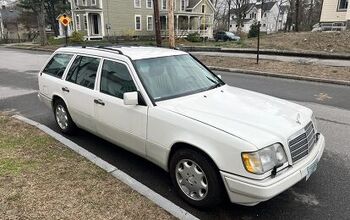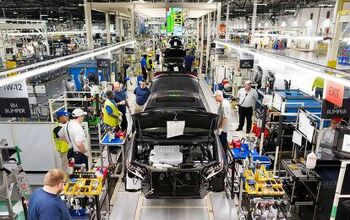Nissan Temporarily Shutters Global Headquarters, Japanese Factories

Nissan said Tuesday that it plans to temporarily shut down its global headquarters and several factories in Japan to help curtail the spread of the novel coronavirus. While Japanese automakers are legally allowed to operate within the country (with conditions), most have instituted some amount of health countermeasures independently. The nation has also formed a joint council for automakers and component suppliers to work with the government in maintaining supply chains while avoiding future contagion risks.
Despite the level of precautions taken, the country’s automakers are still estimated to lose at least $1.6 billion as the pandemic suppresses demand around the world. Nissan, which issued profit warnings in 2019, went into 2020 expecting to eliminate thousands of positions so it could begin amassing $4.4 billion in savings by 2023. Marketing budgets and product lineups would also need to be rejiggered dramatically to assure profitability moving forward. With the coronavirus further complicating the company’s strategy, May’s idling could be about more than just containing the coronavirus.
Most Japanese automakers, including Nissan, have already stalled production due to supply chain issues and an overwhelming lack of customers. According to Reuters, Nissan said that 15,000 employees at its headquarters in Yokohama and main R&D center in the nearby Atsugi, Kanagawa Prefecture would be required to take leave for 16 days from next Monday through Japan’s “Golden Week” holiday — starting on May 4th.
From Reuters:
Its headquarters would be closed to all but essential workers, a Nissan spokeswoman said, adding that those affected would receive “the majority” of their full salaries during the period.
The spokeswoman said the measures were aimed at keeping more than 90 percent of its employees away from its offices, up from 80 percent at the moment.
Like many of its global rivals, Nissan has also shuttered most of its global production facilities in compliance with “shelter at home” directives to contain the spread of the virus.
Admirable. But Nissan is also expected to make huge production cuts in the years ahead — becoming a smaller, more stable company. That’s the hope, anyway. Analysts were predicting annual targets being cut by as much as 1 million units before the pandemic. The manufacturer is expected to released a revised plan (one that accounts for the coronavirus) next month, with most under the impression that intensified downsizing will be necessary. Nissan’s not alone in this, however. Rivals in better financial health have said they’re expecting 2020 production levels to be off target by as much as 50 percent.
By idling its headquarters, the automaker can probably save itself a bit of money as it also helps enact some useful social distancing measures. Still, it’s hardly an ideal scenario for the company. Many of non-essential workers will continue drawing from funds that can’t be replenished until things improve. But it doesn’t make much sense to ask them to come in when there’s precious little going on, and having assembly lines running when nobody’s buying automobiles seems unwise.
Nissan has already stalled production at its Tochigi plant — which produces Infiniti models — for the rest of this month and intends to continue doing so through much of May. Meanwhile, Nissan Motor Kyushu — which manufactures exported Rogue models in Fukuoka Prefecture — will continue operating on limited shifts before a brief 4-day closure next month.
Japanese automakers have already enacted plant closures in the United States and, more recently, have started scaling back production in their home country. Toyota slowed output to keep pace with demand and Honda said it will probably suspend production at several facilities to address supply chain problems with formerly shuttered Chinese factories that reopened on a limited basis.
[Image: FotograFFF/Shutterstock]

A staunch consumer advocate tracking industry trends and regulation. Before joining TTAC, Matt spent a decade working for marketing and research firms based in NYC. Clients included several of the world’s largest automakers, global tire brands, and aftermarket part suppliers. Dissatisfied with the corporate world and resentful of having to wear suits everyday, he pivoted to writing about cars. Since then, that man has become an ardent supporter of the right-to-repair movement, been interviewed on the auto industry by national radio broadcasts, driven more rental cars than anyone ever should, participated in amateur rallying events, and received the requisite minimum training as sanctioned by the SCCA. Handy with a wrench, Matt grew up surrounded by Detroit auto workers and managed to get a pizza delivery job before he was legally eligible. He later found himself driving box trucks through Manhattan, guaranteeing future sympathy for actual truckers. He continues to conduct research pertaining to the automotive sector as an independent contractor and has since moved back to his native Michigan, closer to where the cars are born. A contrarian, Matt claims to prefer understeer — stating that front and all-wheel drive vehicles cater best to his driving style.
More by Matt Posky
Latest Car Reviews
Read moreLatest Product Reviews
Read moreRecent Comments
- 3-On-The-Tree Lou_BCone of many cars I sold when I got commissioned into the army. 1964 Dodge D100 with slant six and 3 on the tree, 1973 Plymouth Duster with slant six, 1974 dodge dart custom with a 318. 1990 Bronco 5.0 which was our snowboard rig for Wa state and Whistler/Blackcomb BC. Now :my trail rigs are a 1985 Toyota FJ60 Land cruiser and 86 Suzuki Samurai.
- RHD They are going to crash and burn like Country Garden and Evergrande (the Chinese property behemoths) if they don't fix their problems post-haste.
- Golden2husky The biggest hurdle for us would be the lack of a good charging network for road tripping as we are at the point in our lives that we will be traveling quite a bit. I'd rather pay more for longer range so the cheaper models would probably not make the cut. Improve the charging infrastructure and I'm certainly going to give one a try. This is more important that a lowish entry price IMHO.
- Add Lightness I have nothing against paying more to get quality (think Toyota vs Chryco) but hate all the silly, non-mandated 'stuff' that automakers load onto cars based on what non-gearhead focus groups tell them they need to have in a car. I blame focus groups for automatic everything and double drivetrains (AWD) that really never gets used 98% of the time. The other 2% of the time, one goes looking for a place to need it to rationanalize the purchase.
- Ger65691276 I would never buy an electric car never in my lifetime I will gas is my way of going electric is not green email


































Comments
Join the conversation
When I lived in Mexico in the 1980s the company I worked for had a fleet of those small Nissan pickups. https://imganuncios.mitula.net/nissan_estaquita_redilas_2002_63_excelentes_100942873099908206.jpg Absolutely no frills, but reliable as hell. Most so that as company vehicles they never had the personal tender love that a private vehicle has. Myself, I also drove what in Mexico the model was labeled a Nissan Tsuru. Again, ancient design, absolutely no frills, but it never failed. This thing was so reliable and easy to repair that became the vehicle of choice for Mexico City's enormous cab driver fleet. https://cs1.gtaall.com/screenshots/4dc09/2017-03/original/b7fa41838a17dd79a626b740b69ee22621de2488/389411-enb-2017-03-13-01-21-53-62.jpg
I wouldn't mind it if Nissan came out with a real no frills compact pickup with a 5 or 6 speed manual.